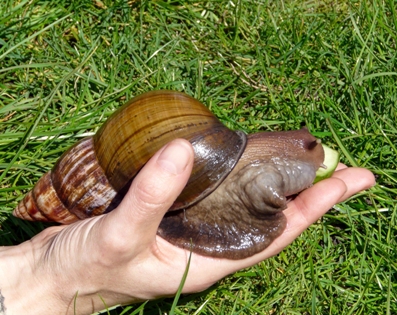Nutrition
Daedalochila leporina
(Polygyra
leporina)
Nutrition
It is known that many mollusks, including
Polygyra snails, eat
fungi. There is not much
else that we know about the food that is consumed by snails of the
genus Polygyra.
Feeding designs left on a leaf showed that a snail, named
Mesodon
thyroidus, had eaten fungi
off of the leaf
(Wolf et al., 1939).
In an experiment,
Mesodon thyroidus also chose to eat fungi over lettuce or other
food containing chlorophyll
(Wolf et al., 1939).
The snail was then classified as mycophagous, which means fungi
feeding
(Wolf et al., 1939).
Other Snails’ Nutrition
While there is not very much information about
what Daedalochila leporina
(Polygyra
leporina) feeds
on, other snails have very interesting diets.
One group of snails that are popular as pets in the United
Kingdom, but illegal in the United States because of the fear of
them becoming an invasive species, are the Giant African land
snails. Giant African land
snails are really large invasive problems in some parts of the world
so it is a reasonable thing to be afraid of. The Giant
African land snails, Achatina
fulica (East African land snail),
Achatina marginata (West
African land snail), and Achatina achatina (Tiger Snail), have a diet that is very unusual
(McLeod, 2006). The
Giant African land snails feed mainly on a variety of fruits and
vegetables such as cucumbers, tomatoes, lettuce, peppers, apples,
grapes, and bananas
(McLeod, 2006). Some
Giant African land snails will even eat brown bread or moistened dog
biscuits
(McLeod, 2006).
Another crucial element to Giant African land snails’ diets, as well
as other snails, is the need of a calcium supplement so that the
snail’s shell can maintain its strength
(McLeod, 2006). One
source of this calcium is from a cuttlebone which is an internal
skeletal structure found in cuttlefish
(McLeod, 2006).

